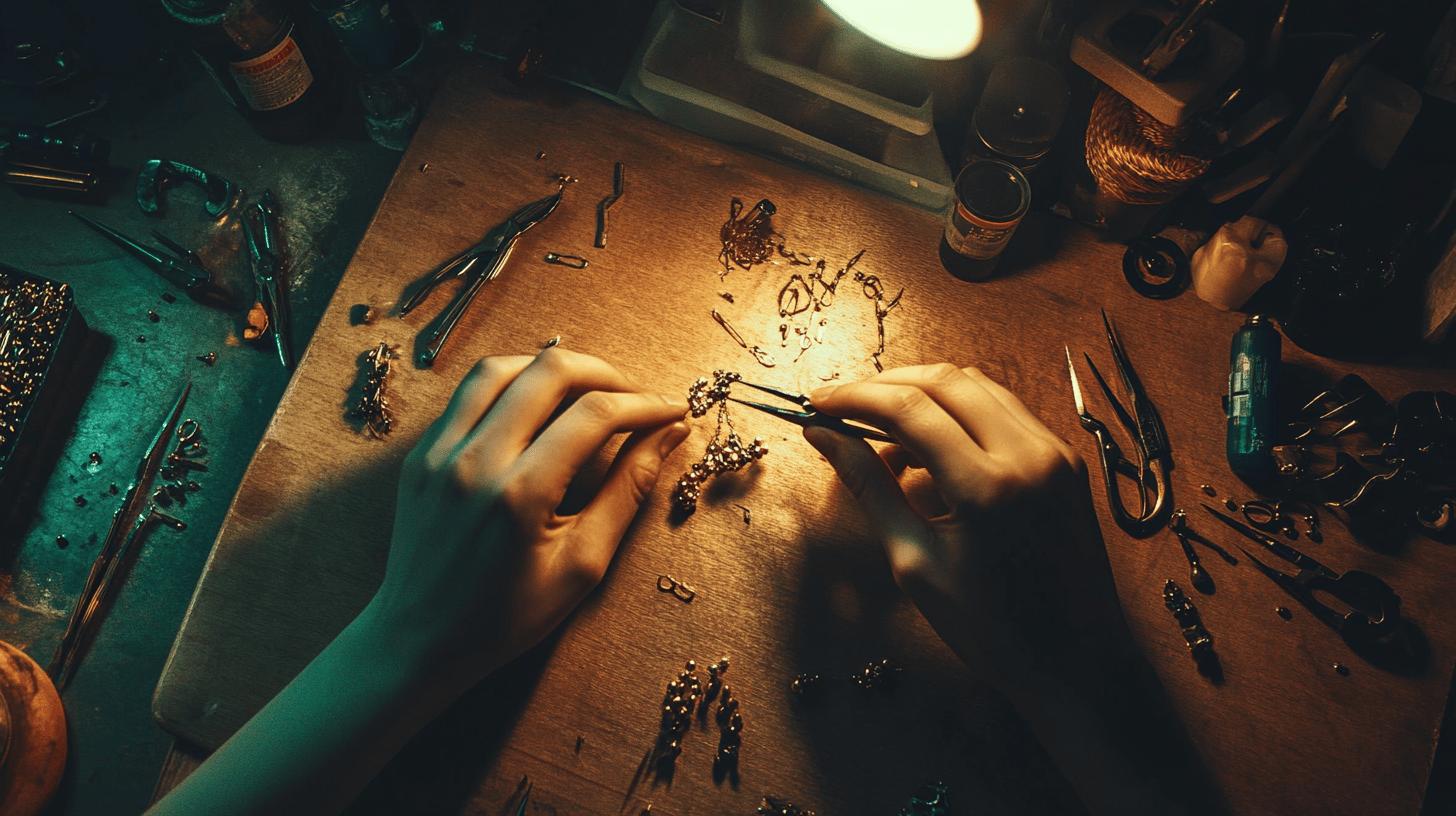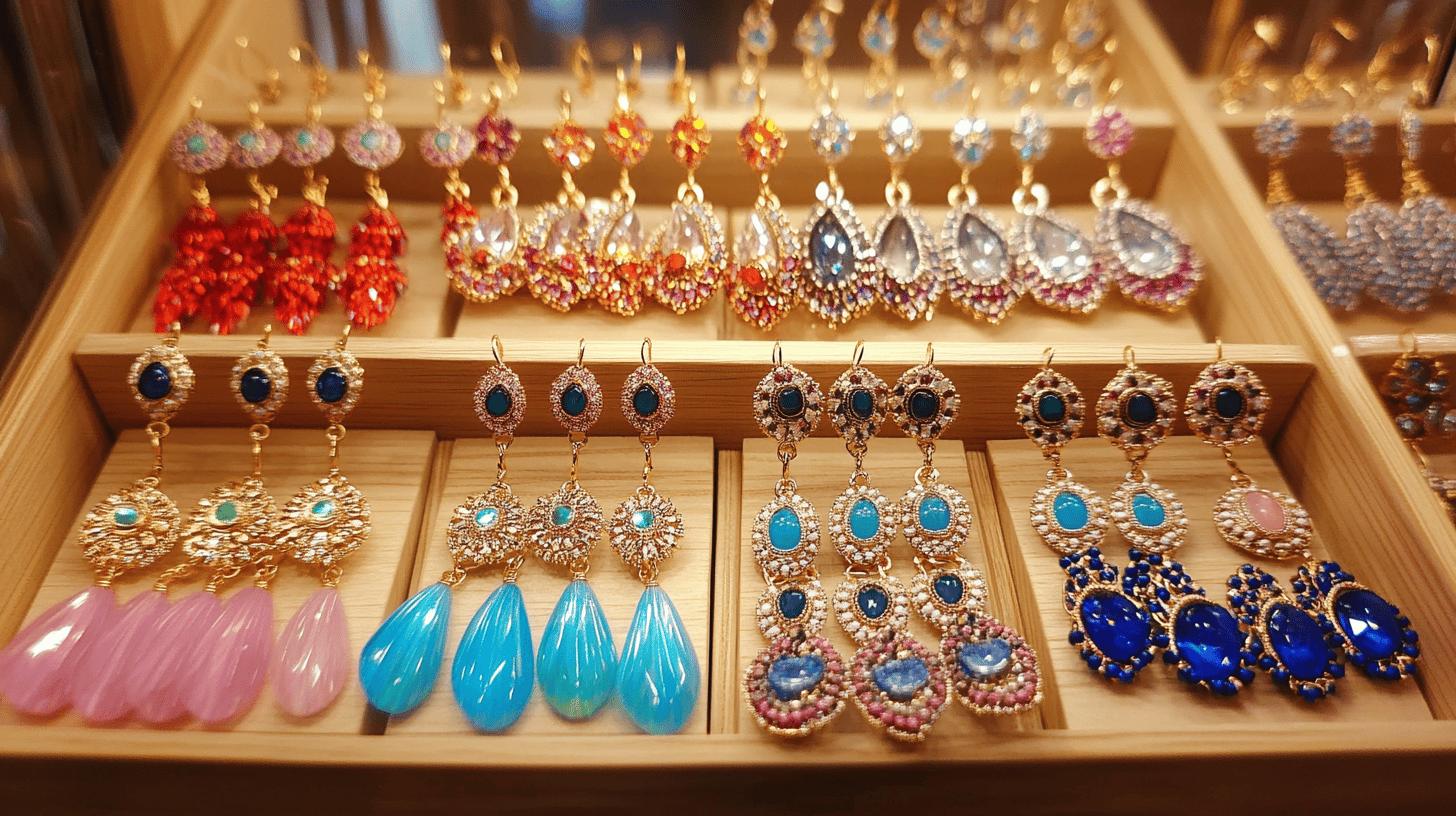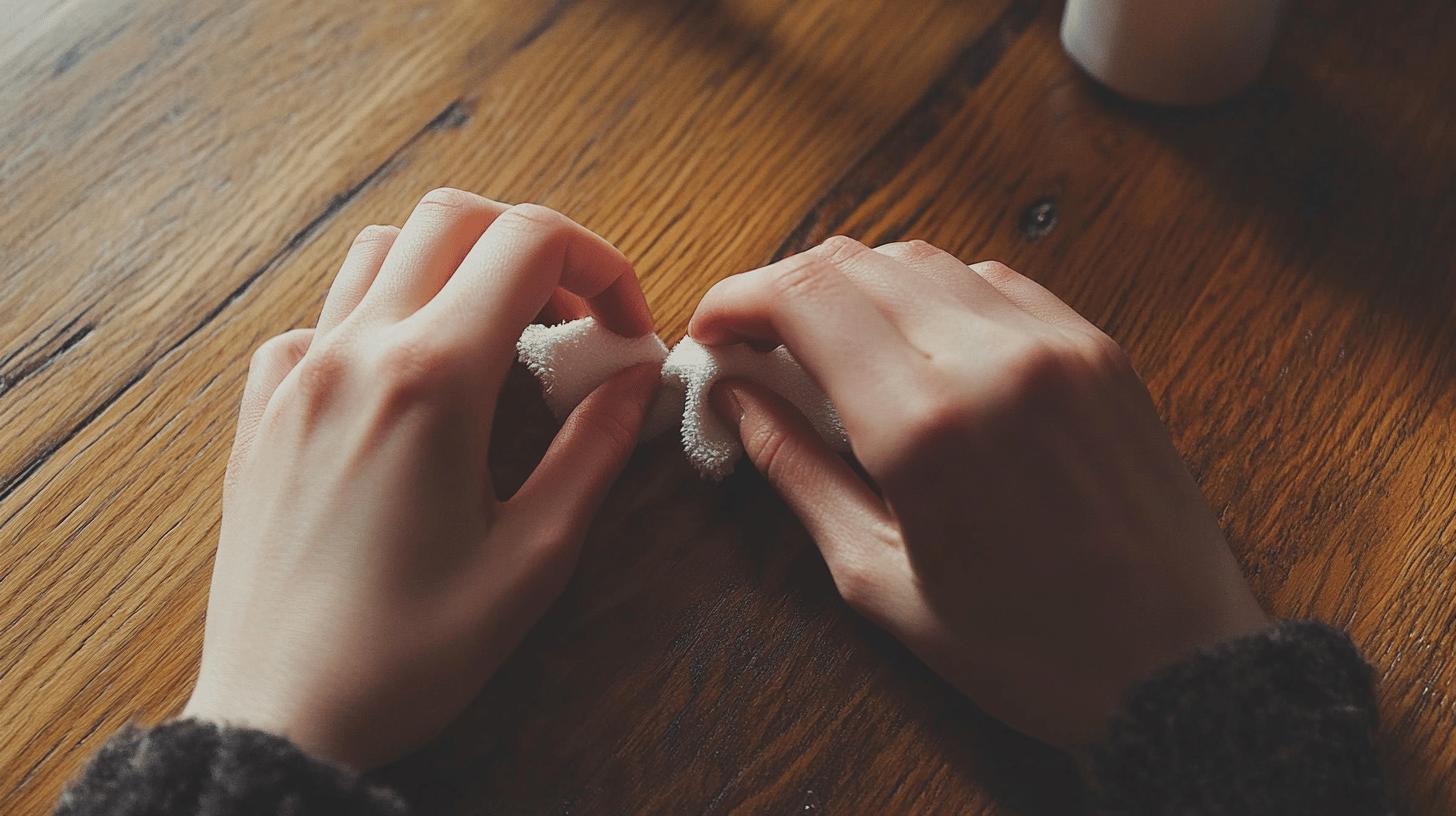
So, have you ever wondered about the hidden dangers lurking in second-hand earrings? Cleaning them properly is paramount to avoid any potential health risks. In this article, we’ll delve into the safest methods to ensure your pre-loved gems are as good as new. Equipped with the right materials and techniques, maintaining the beauty and hygiene of your earrings becomes effortless. So, lets dive in as we guide you through step-by-step instructions, expert tips, and home remedies, all aimed at keeping your earrings sparkling and safe. Ready to transform your cleaning routine? Let’s get started!
Essential Materials for Cleaning Second Hand Earrings
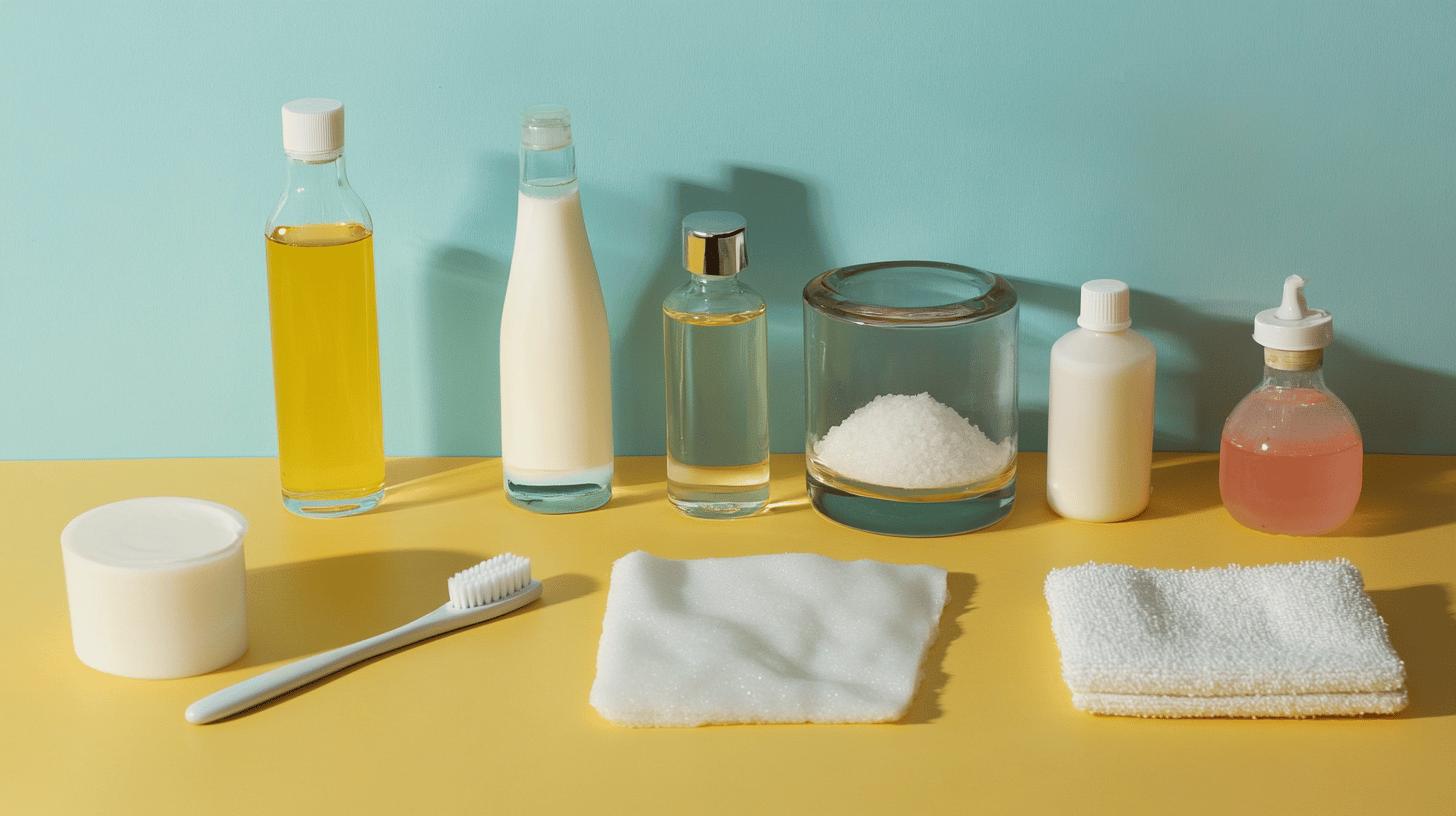
Using the right materials and tools is crucial to ensure second-hand earrings are thoroughly cleaned and not damaged during the process. Harsh chemicals or abrasive tools can tarnish metals and harm delicate stones. So, therefore, opting for gentle, yet effective cleaning agents is essential for maintaining the integrity of your earrings.
Each material listed below plays a vital role in the cleaning process. Mild soap and water create a gentle solution that removes surface dirt without causing harm. Alcohol and hydrogen peroxide are excellent for disinfecting, while baking soda and vinegar are natural cleaners that help tackle tarnish and grime. A soft-bristled toothbrush allows for delicate scrubbing, and a soft cloth is perfect for drying and polishing.
- Mild Soap
- Water
- Soft-bristled toothbrush
- Alcohol
- Hydrogen Peroxide
- Baking Soda
- Vinegar
- Salt
- Soft Cloth
Step-by-Step Guide to Clean Second Hand Earrings
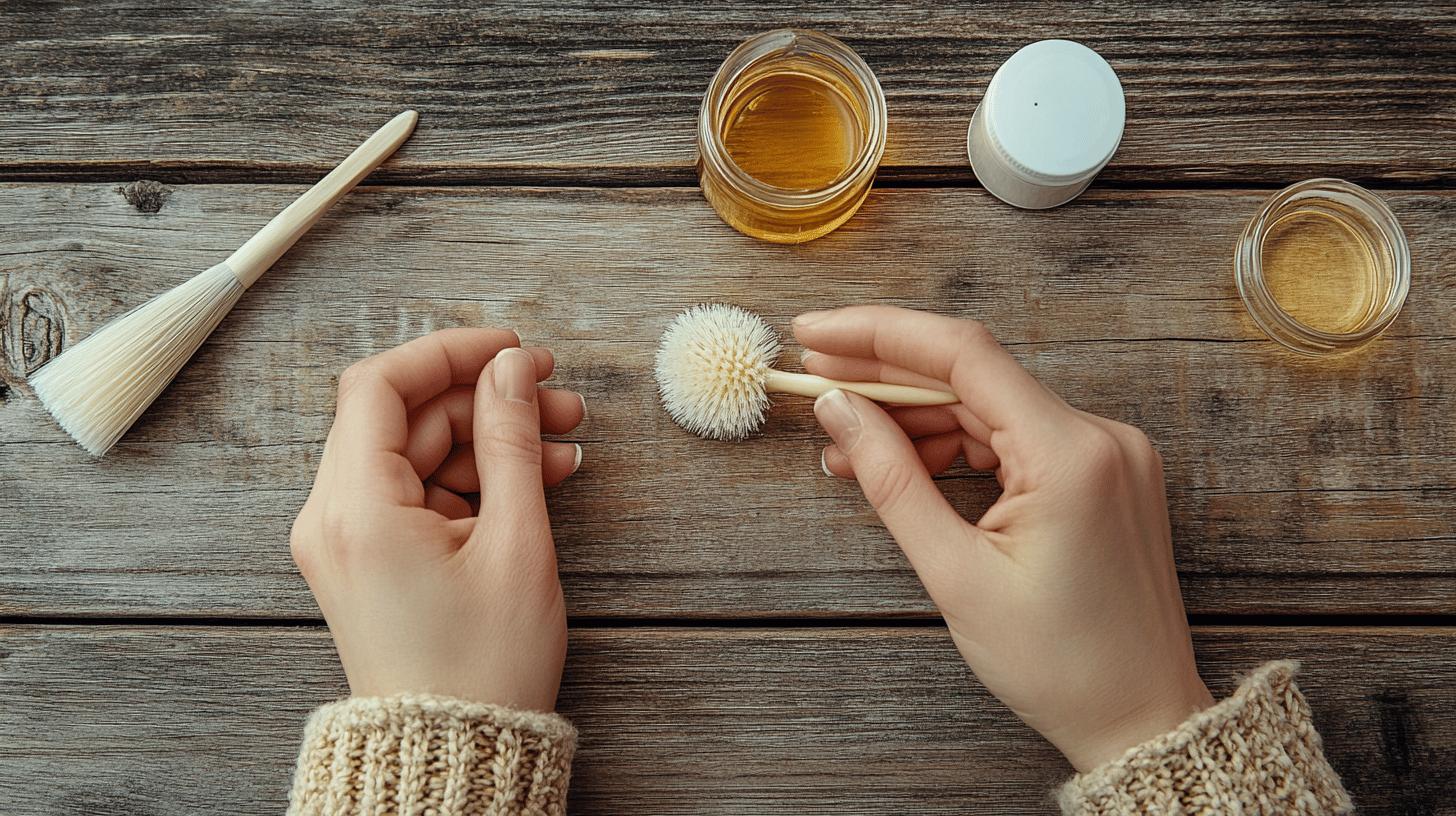
Soaking is a crucial first step in cleaning second-hand earrings. Soaking helps to loosen any dirt, grime, or potential bacteria on the surface of the earrings, making the subsequent cleaning steps more effective. Use a mild solution of soap and water or, for a deeper clean, an alcohol solution. So, this initial soak should last around 15-20 minutes.
After soaking, a soft-bristled toothbrush is your best tool for gently scrubbing the earrings. This tool allows you to get into crevices and intricate designs without damaging the metal or stones. Be gentle, this is because delicate materials like gold and silver can be scratched on the surface. For costume jewellery, ensure the brush is even softer to prevent wear and tear.
Rinsing and drying are the final, yet equally important steps. Rinse the earrings thoroughly with clean water to remove any soap, alcohol, or other cleaning agents. This ensures that no residue is left behind, which could irritate the skin or damage the earrings over time. Once rinsed, dry the earrings with a soft cloth or allow them to air dry. This step is particularly important for preventing tarnish and maintaining the shine of your jewellery.
- Soak earrings in a mild solution (soap and water or alcohol).
- Use a soft-bristled toothbrush to gently scrub, because we want to avoid unnecessary scratches.
- Rinse thoroughly with clean water.
- Dry with a soft cloth or let air dry.
Home Remedies for Cleaning Different Earring Materials
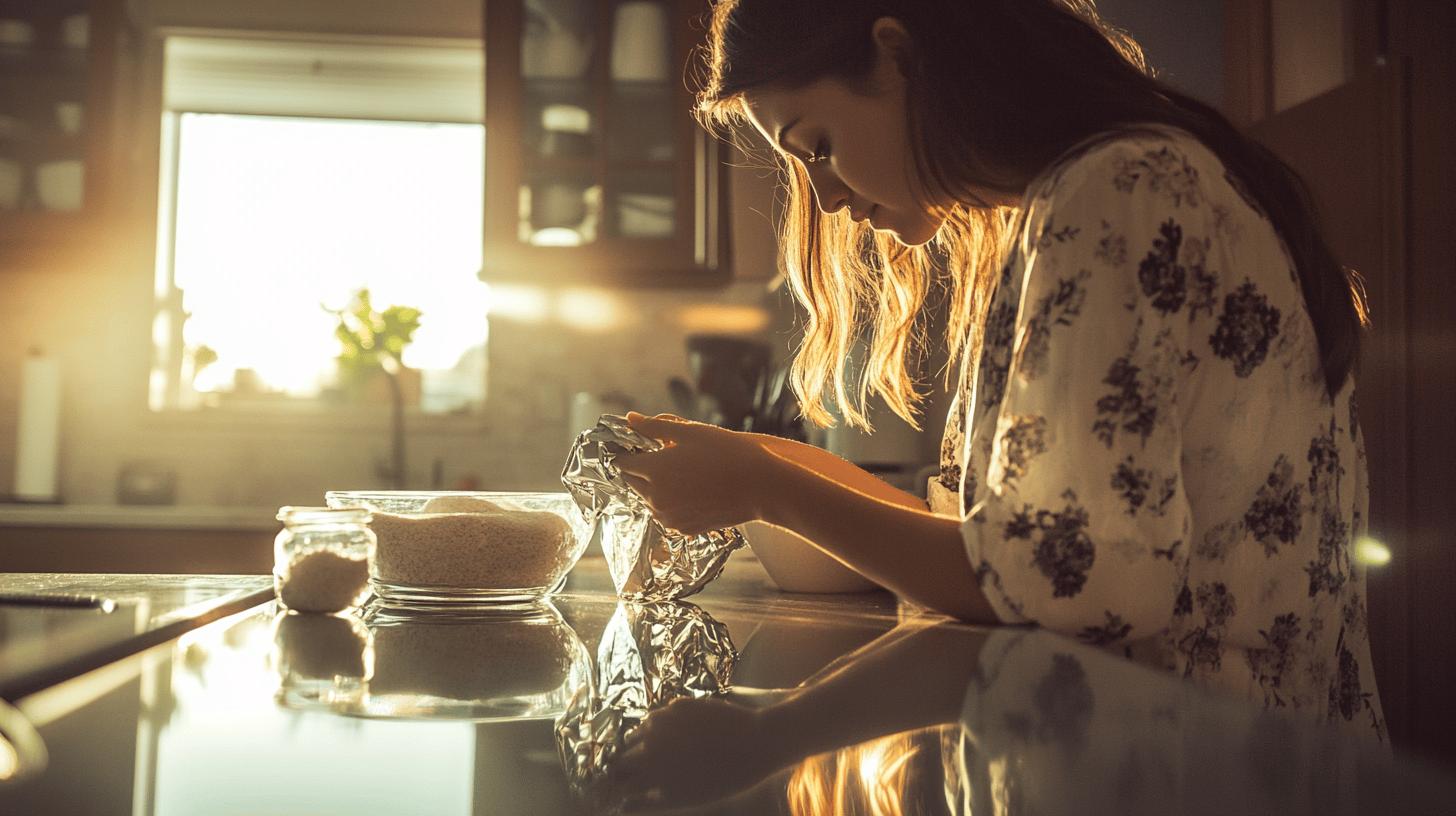
The baking soda and aluminium foil method is a popular home remedy for cleaning tarnished jewellery. This process involves lining a bowl with aluminium foil, adding a tablespoon of baking soda, and pouring in hot water. Place the tarnished earrings in the solution for a few minutes, this is so it allowing the chemical reaction to lift the tarnish. This method is particularly effective for silver jewellery, as it restores the shine without causing damage.
For cleaning silver earrings, vinegar and baking soda offer a potent combination. By mixing half a cup of white vinegar with two tablespoons of baking soda, you create a solution that can dissolve grime and restore lustre. Soak the earrings in this mixture for two to three hours, then rinse with cold water and dry with a soft cloth. So because this method is gentle yet thorough, it happily ensures your silver earrings remain in top condition.
- Baking soda and aluminium foil method for tarnished jewellery.
- Vinegar and baking soda for silver earrings.
- Mild soap and warm water for gold earrings.
Read More: Why Do My Ears Hurt Wearing Earrings?
Disinfecting Second Hand Earrings Safely
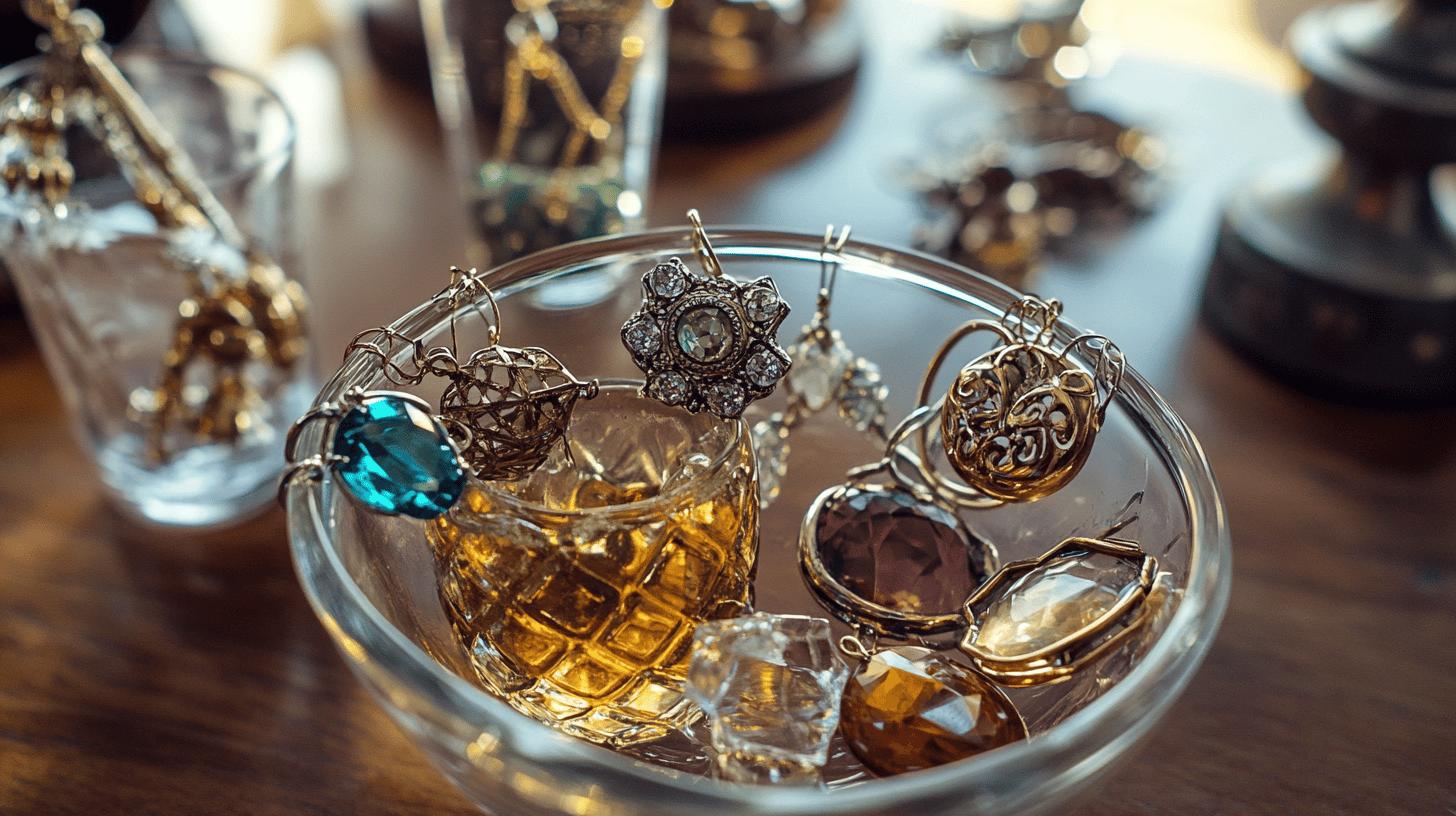
Alcohol and hydrogen peroxide are two of the most effective agents for disinfecting second-hand earrings. They work by killing bacteria and other pathogens that may be present on the surface. To use alcohol, simply soak the earrings in a bowl filled with isopropyl alcohol for about 10 minutes. This method is especially effective for metal earrings, as it penetrates small crevices where bacteria might hide. Hydrogen peroxide can be used similarly; a 3% solution is generally safe and effective. Soak the earrings for around 10 minutes, ensuring they are fully submerged. After soaking, rinse the earrings thoroughly with clean water to remove any residual disinfectant.
Proper soaking and drying are essential to ensure that all disinfectants are effectively removed, and to prevent any potential irritation or damage to the earrings. After soaking in alcohol or hydrogen peroxide, rinse the earrings under running water for at least one minute. This helps to wash away any lingering disinfectant that could cause skin irritation or tarnish the metal. Dry the earrings completely using a soft cloth or let them air dry on a clean surface. Moisture left on earrings can lead to tarnishing or even rust in some metals, so ensuring they are thoroughly dry is crucial.
- Alcohol soak.
- Hydrogen peroxide soak.
- Saltwater solution.
- Boiling water method.
Expert Tips for Maintaining Second Hand Earrings
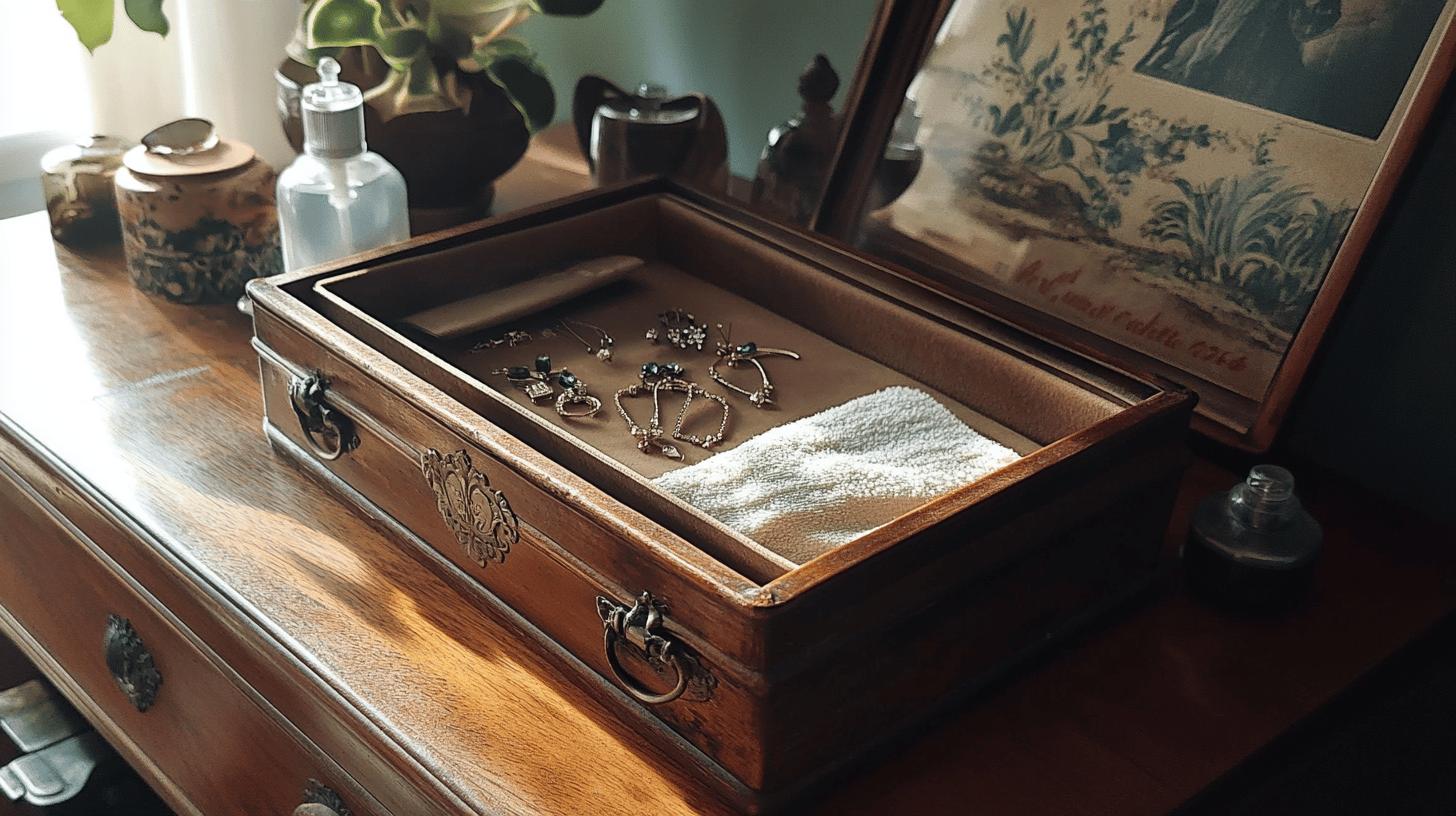
Regular cleaning and inspection are crucial for maintaining the quality and hygiene of second-hand earrings. How often should you clean your earrings?
Clean your earrings at least once a week. This prevents the build-up of grime and bacteria, ensuring they remain safe to wear. Inspections should be done monthly to check for signs of wear and tear, such as loose stones or damaged clasps. What should you look for during inspections?
Look for any signs of discoloration, loose parts, or scratches. Addressing these issues promptly can prevent further damage.
Proper storage practices are essential to prevent tarnishing and damage. How should you store your earrings?
Store your earrings in a dry, clean place. A jewellery box with individual compartments is ideal, as it keeps each pair separated and prevents scratching. Consider using anti-tarnish strips or silica gel packs inside the box, because they work to absorb moisture and reduce the risk of tarnishing. What is the best way to store delicate earrings?
For delicate earrings, wrap them in a soft cloth before placing them in the jewellery box. This adds an extra layer of protection.
Occasionally using professional cleaning services can greatly benefit the longevity of your earrings. Why should you use professional services?
Professional jewellers have specialised tools and knowledge. They can clean, polish, and repair your earrings more effectively than at-home methods. It is advisable to take your earrings for a professional cleaning every six months. This ensures they receive a thorough cleaning and any potential issues are addressed by experts.
Read More: How to Get Flat Back Earrings Out Easily
Common Mistakes to Avoid When Cleaning Earrings
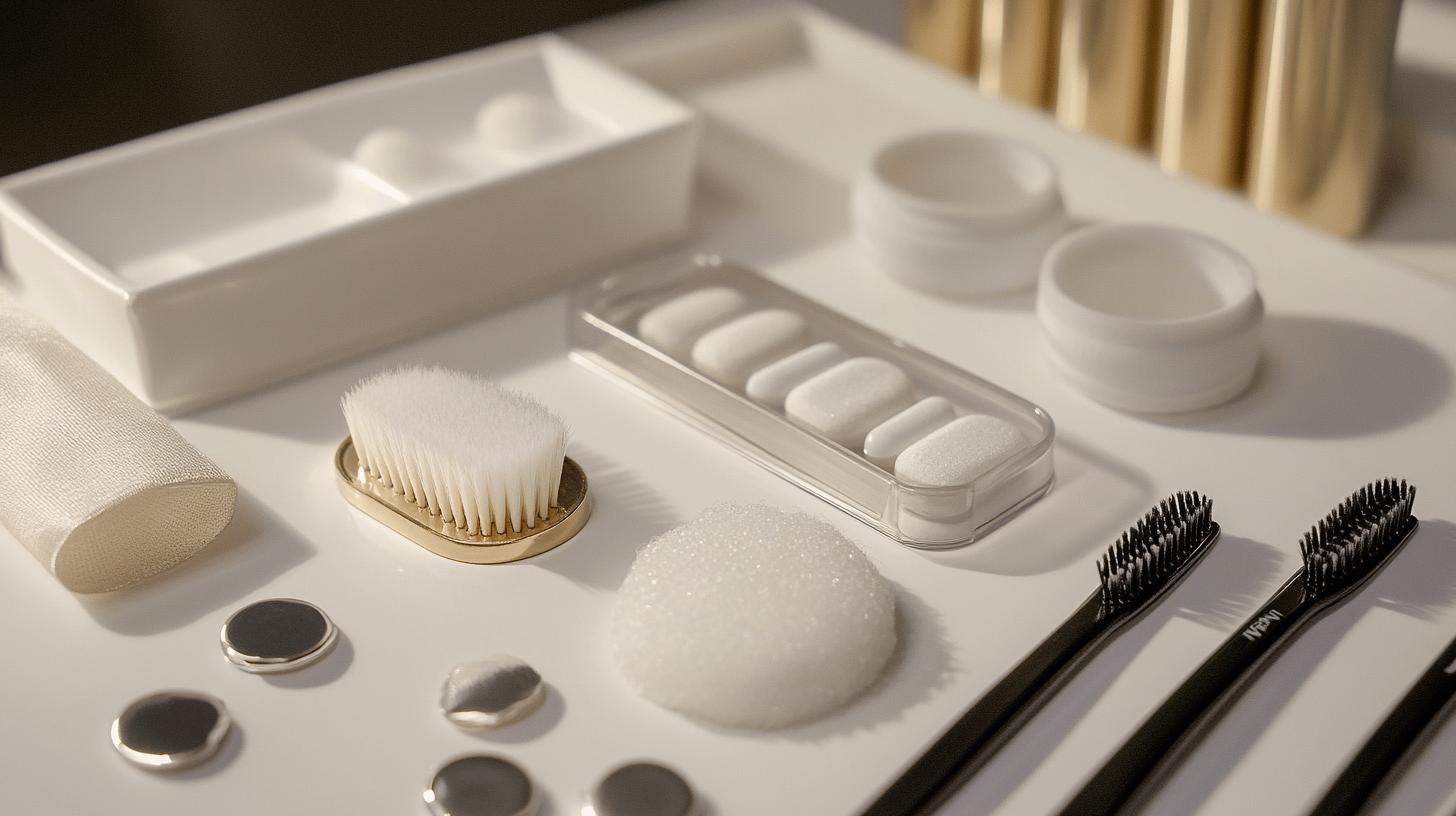
Using harsh chemicals and abrasive tools can severely damage your earrings.
Why should you avoid harsh chemicals? Harsh chemicals, such as bleach or ammonia, can strip the metal’s protective coating, leading to tarnish or discolouration.
Why should you avoid abrasive tools? So, abrasive tools, like hard-bristled brushes or scouring pads, can scratch the surface of the metal and stones, diminishing their shine and potentially causing irreversible damage. Always opt for gentle cleaning agents and soft-bristled brushes to maintain the integrity of your earrings.
How can delicate stones be damaged? Soaking earrings with delicate stones in water or cleaning solutions can loosen the settings and cause the stones to fall out. Because of this we suggest a different method.
What should you do instead? So, instead, gently wipe these earrings with a damp cloth. Costume jewellery requires extra caution.
Why is costume jewellery different? The materials used in costume jewellery are often less durable and more susceptible to damage.
How should you clean costume jewellery? Use minimal liquid and avoid prolonged exposure to water or cleaning solutions. You want to do that because it ensures that the adhesive used to set stones does not weaken, and the surface remains intact.
- Avoid using harsh chemicals.
- Do not use abrasive tools.
- Do not soak earrings with delicate stones.
- Be cautious with costume jewellery.
Read More: How to Make Earrings with Beads: Quick Tips
Recommended Cleaning Products for Second Hand Earrings
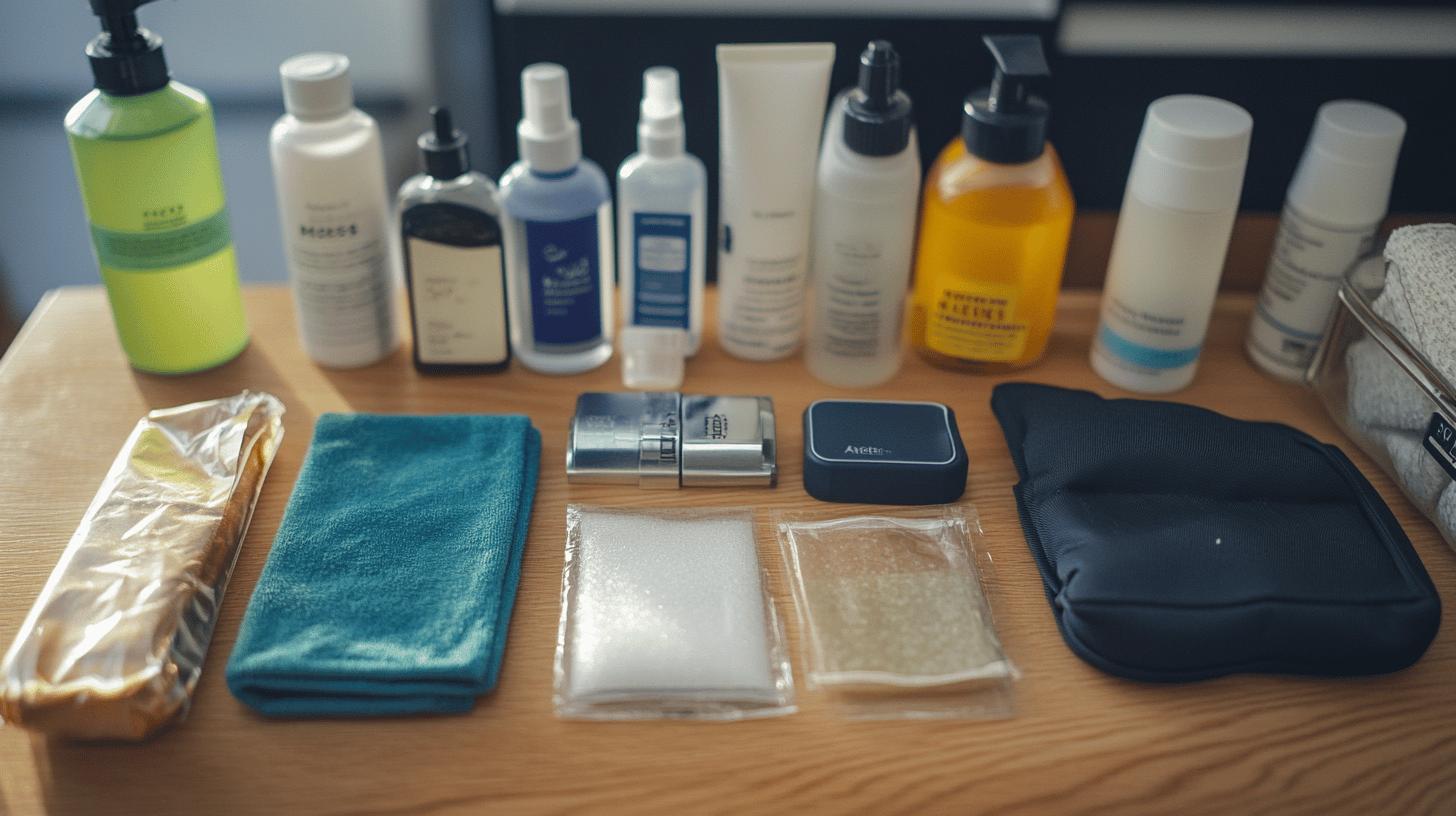
Specific products are highly effective for cleaning different types of second-hand earrings, including silver, gold, and costume jewellery. For silver earrings, specialised silver cleaners are ideal for removing tarnish and restoring shine without causing damage. Mild soaps are versatile and safe for most materials, providing a gentle yet effective cleaning solution. Alcohol wipes are particularly useful for disinfecting metal parts, ensuring that the earrings are hygienic and safe to wear. These products not only clean but also help maintain the integrity and appearance of your earrings.
Amore Jewellery offers a range of high-quality cleaning solutions designed specifically for different types of jewellery. Their silver cleaners are formulated to remove tarnish and restore lustre without harming the metal. Mild soaps from Amore Jewellery are gentle on delicate materials, making them suitable for regular use. Additionally, their alcohol wipes provide a quick and effective way to disinfect earrings, making them a convenient option for on-the-go cleaning. Using these products ensures that your second-hand earrings remain in excellent condition and are safe to wear.
- Specific silver cleaners.
- Mild soaps.
- Alcohol wipes.
Final Words
In the action of learning how to clean second-hand earrings, knowing the essential materials and safe steps is fundamental. Effective cleaning methods ensure your jewellery maintains its beauty and hygiene.
Whether using mild soap or a soft-bristled toothbrush, each material plays a crucial role in preserving your earrings. Understanding various home remedies and disinfecting processes adds a layer of confidence in your maintenance routine.
Finally, always remember expert tips to avoid common cleaning mistakes. Your earrings deserve the best care, and with the right practices, they will remain sparkling and fresh. Enjoy wearing your clean, beautiful second-hand earrings with pride.
FAQ
How to Clean Second Hand Earrings with Vinegar?
To clean second-hand earrings with vinegar, mix equal parts of vinegar and water. Soak the earrings for 15-20 minutes, then gently scrub with a soft-bristled brush. Rinse well and, most importantly, dry with a soft cloth.
How to Disinfect Earrings Without Alcohol?
You can disinfect earrings without alcohol by using hydrogen peroxide, saltwater solution, or boiling water. Soak the earrings in your chosen solution for 5-10 minutes, then rinse and dry thoroughly.
How to Clean Second Hand Earrings at Home?
Cleaning second-hand earrings at home is simple. Soak the earrings in a solution of mild soap and water. Gently scrub with a soft-bristled toothbrush, rinse with clean water, and dry with a soft cloth.
How to Disinfect Earrings at Home?
To disinfect earrings at home, you can use alcohol, hydrogen peroxide, or a saltwater solution. Soak the earrings for 5-10 minutes in any of these solutions, rinse, and dry thoroughly.
How to Sterilise Earrings with Salt?
Sterilise earrings with salt by dissolving a teaspoon of salt in a cup of warm water. Soak the earrings in the solution for 15-20 minutes, then rinse and dry.
How to Sterilise Earrings with Hot Water?
To sterilise earrings with hot water, boil water and let it cool slightly. Submerge the earrings for 5-10 minutes, then rinse but be sure to dry thoroughly.
How to Disinfect Earrings with Alcohol?
Disinfect earrings with alcohol by soaking them in rubbing alcohol for 5-10 minutes. Rinse thoroughly with clean water and dry with a soft cloth.
How to Sterilise Earrings in the UK?
To sterilise earrings in the UK, you can use methods such as alcohol, hydrogen peroxide, saltwater solution, or boiling water. Choose a method, soak the earrings for 5-10 minutes, rinse, and dry.
How Do You Clean a Thrifted Earring?
To clean thrifted earrings, soak them in a mixture of mild soap and water. Gently scrub with a soft-bristled brush, rinse well, and make sure to dry with a soft cloth.
How Do You Clean an Old Pair of Earrings?
Clean old earrings by soaking them in a solution of mild soap and water. Use a soft-bristled brush to remove dirt, rinse thoroughly, and dry with a soft cloth.
How to Disinfect New Earrings?
Disinfect new earrings by soaking them in rubbing alcohol or, alternatively, hydrogen peroxide for 5-10 minutes. Rinse thoroughly with clean water and dry with a soft cloth.
Can I Use Hand Sanitiser to Disinfect Earrings?
Hand sanitiser is not recommended for disinfecting earrings. It may not be effective and could damage delicate materials. So, use alcohol, hydrogen peroxide, or a saltwater solution instead.

